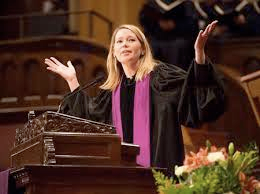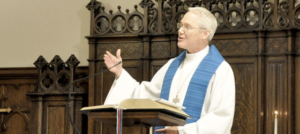Co-missioners,
“As the Father has sent me, so I send you.” Thus St. John’s version of the Great Commission. We heard it in church a few days ago as we always do on the Second Sunday of Easter. Those who listened closely caught Christ our risen Lord authorizing a lavish, exuberant use of the Gospel. “Forgive sins! Hang on to sinners!” (Here we follow a reading of John 20:23 that Jerry Burce argued for five years ago.)
Turns out that Gospel-driven exuberance is hard to find in churches these days. Or so observes a dear friend of our Crossings community. She’s been spending her pandemic-era Sundays trolling church websites for sermons that leave her thanking God for our crucified and eastered Christ. Her disappointment led her to ask another Crossings friend, Steve Hitchcock, why the Gospel is so often missing from what she hears, even—especially?—on ELCA-related websites. Steve shared his response with us. We thought it worth sharing with the rest of you too.
In case you don’t Steve, he’s a graduate of Valparaiso University and Seminex who is presently wrapping up a career with Bread for the World. Steve knows what the Gospel is and is not. Please join us in thanking God for his decades of faithful service and witness to our Lord Jesus Christ.
Peace and Joy,
The Crossings Community
Why is the Gospel not Preached?
A Note to a Friend
by Steve Hitchcock

I.
The reality is that too few preachers have received the education (including hearing sermons by accomplished preachers) to know and trust that we are saved by grace through faith in the crucified and risen Christ. As a result, what most people hear on Sunday morning are exhortations to some sort of personal morality or admonitions to “works of justice.” In other cases, sermons extol God’s love and divine providence: God is great, God is good.
Yet many of us have been lucky enough to have received the education and experience to equip us to boldly proclaim the Gospel. We know the joy of trusting the Promise of Christ’s full benefits for us.
Still, we struggle to preach that good news Sunday after Sunday. Our preaching is often timid, unfocused, and confusing. We are frequently tempted to attach “soft” strings to the grace and mercy. We try to offer grace-filled descriptions of the “fruits of faith,” but they somehow turn into prescriptions for being “good Christians.”
I think our problem is a P6 dilemma. When we get to the sixth stage of the Crossings diagnosis-prognosis matrix, we stumble. That’s the primary reason, in my view, that those who want to preach the Gospel struggle to do so.
The Promise we trust is ultimately the promise of freedom from sin, evil, and death. We are free because we receive unconditional forgiveness—for us and for all those who have been buried and raised with Christ in baptism. We are given a new identity; we become a new creation. The Gospel is news about who we are, not what we should be doing.
If we are a new creation, then everything we do as baptized persons is pleasing in God’s sight. That means there’s nothing we have to do. And that’s the rub: how do you tell people on a Sunday morning that they don’t have to do anything, that they are free to decide how to spend their time and energy—because the Spirit of the Risen Christ is now guiding their thoughts and actions?
At “best,” the proclamation of freedom can be a perplexing and confusing message. At “worst,” that offer of freedom can be frightening—a blank slate without even any chalk to write.
II.
 If you’re willing to make that bold Promise of radical freedom, you’ll need some words that serve as the audible proclamation of the Word that embodies the Promise. That, in my view, is the second reason we don’t hear the Gospel from many pulpits.
If you’re willing to make that bold Promise of radical freedom, you’ll need some words that serve as the audible proclamation of the Word that embodies the Promise. That, in my view, is the second reason we don’t hear the Gospel from many pulpits.
Few seminary students are exposed to the rigorous and continuous study of the Scriptures. Seminaries have accelerated the M.Div. curriculum, and financial constraints limit the number of faculty positions in biblical studies. Most pastors have their time and energy consumed by “managing the business” of parishes that have become complex nonprofit organizations. They have far too little time for sermon preparation and even less for the study of Scriptures.
All this means that the preacher doesn’t have full access to the springboard that the Scriptures provide for keeping our sights—and our hearts—focused on the Promise.
The Gospels—the pivot point for most Sunday worship events—are saturated with images and allusions, phrases, and individual words that point to the crucified and risen Jesus as the means by which God rescues and revives we who have been condemned to death.
In the Gospels, we don’t have to wait until the accounts of Jesus’ crucifixion and resurrection to hear saving news. Right from the start, the Gospels proclaim a crucified and risen Christ. With its quote from Isaiah (Malachi), the opening verses of Mark’s Gospel alerts us to a suffering servant. In his baptism, Jesus is already “buried and raised.”
The first chapter of John’s Gospel opens with the prologue to narrative, followed by Jesus’ baptism and the calling of the disciples. Already, in Chapter Two with the wedding in Cana and its massive vats of water and wine, we are awash in baptism and eucharist—connected to Jesus’ hour of glory, namely his elevation on the cross.
Because of the age of these writings and our modern mindsets, it’s easy for us to miss these allusions and signposts to death and resurrection. It’s too easy to use the Scriptures as a guidebook for ethical living or an inspiration to positive thinking. It takes scholarly study and repeated reading for the Good News to surface.
We confess that the words of Scriptures are the clearest and most authoritative source for hearing the Word, but we live—and preach—in a time when we don’t seem to have the time or the training to unlock the power of those words.
III.
The third roadblock to preaching the Gospel is that it is Good News for others. As Paul’s letters and the four Gospels make clear, this good news compels mission. When we hear the Promise, we can’t help but share it with others, and that sharing can’t be confined to one culture or one geography.
 In our current situation, letting that “Gospel for Others” loose on a Sunday has upsetting implications. This is certainly the case for people like us who identify with the prevailing cultural and political leanings of the ELCA. If all those who trust the Promise have truly been forgiven and redeemed, then a lot of “unsavory” folks—Republicans, Southern Baptists, and rigidly patriarchal Africans—are our siblings in Christ Jesus. How can we possibly accept that fact? How can we stand to be associated with those individuals—to say nothing of some of those irritating and obnoxious members of our local church?
In our current situation, letting that “Gospel for Others” loose on a Sunday has upsetting implications. This is certainly the case for people like us who identify with the prevailing cultural and political leanings of the ELCA. If all those who trust the Promise have truly been forgiven and redeemed, then a lot of “unsavory” folks—Republicans, Southern Baptists, and rigidly patriarchal Africans—are our siblings in Christ Jesus. How can we possibly accept that fact? How can we stand to be associated with those individuals—to say nothing of some of those irritating and obnoxious members of our local church?
In our highly polarized and educationally stratified society, we have an instinctual aversion to offering forgiveness for all and rejoicing in the unity of all who confess Christ. I suspect that our P6 descriptions of the Spirit-led life of freedom aren’t situated in contexts like stock car racing, beauty pageants, or the coming hunting season. It’s so hard to accept that “those people” can possibly trust the Promise and be part of the risen body of Christ.
IV.
Whew! What an impossible task then is proclaiming the Gospel. May God grant us the courage, a clear mind, and the time needed for us to keep trying to offer a coherent and compelling invitation to trust the Promise.
Perhaps, though, if we can risk and stumble our way to proclaiming that radical freedom and welcome for all who trust the crucified and risen Christ, then more people will hear the Gospel preached. The Scriptures and history suggest that when that happens in one place, then it begins happening in many other places.




You must be logged in to post a comment.